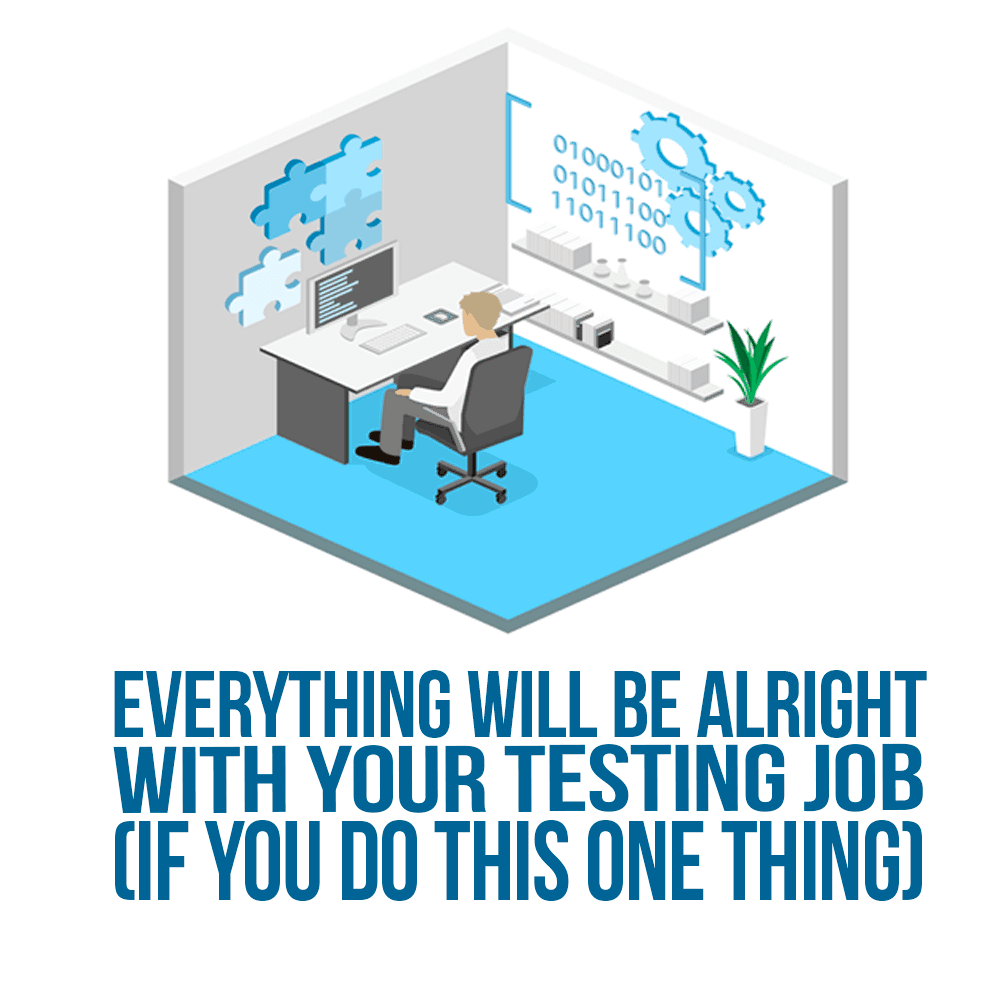
Their work days are so busy with creating test cases and executing them. Logging bugs, discussing them with the developers, and verifying the fixes. Executing regression testing on the test, pre-production, or production environment.
This happens week after week, month after month, year after year. Lots of discipline is needed in their work, and much repetition. Things do not change from one day to the next; today is pretty much like yesterday, tomorrow like today.
Life is good, work is predictable, checks come in, everything goes on.
Once in a while, manual testers get a bit anxious hearing about upcoming changes in technology and the market. Especially automation taking over or threatening lots of existing jobs.
According to the media, it seems like something bad is happening for manual testers in England, Ireland, and Scotland. From talking to manual testers in North America, it seems like automation will change things there, too.
However, I don’t see a lot of manual testers getting worried about the coming change.
Our tester basically thinks that “automation is a problem when I will decide that it is a problem” and that “the urgency of learning programming is not high because I don't want it to be high.”
Who else does this? An ostrich. He puts his head in the sand and probably feels so comfortable and calm while doing it. “What I don't see does not exist.”
But that ostrich way of thinking can cause problems for these testers in the long run. If testers don’t start thinking about how automation will affect them, they may be caught unprepared for the future.
The only hope testers have to adequately prepare themselves for the future is through education.
It’s time to confront reality and get ready for upcoming changes by learning new skills and expanding what you have to offer to an employer.
If you educate yourself, you’ll never be out of a job, whether it’s in testing or general programming.
Confrontation With Unpredictable Reality
You may not want to hear that reality isn’t predictable. Even if your job is safe today, there’s no telling what will happen tomorrow.
Your company might suddenly lay off the whole development team, including the tester. Imagine the shock of being in this situation.
You might think: “What the …. just happened? How can this happen to me? Why to me? What did I do to deserve this? What am I going to do now?”
We like to hope for the best—who doesn’t? But preparing for the worst? Noooo, there is no time. We are so busy that we trust that nothing bad will happen, and those signs of change are probably not reliable or trustworthy.
Preparing for the worst requires acknowledging that the worst could happen and giving up on some of your “positive thinking.”
I know, you may say that I am too pessimistic and see only the bad things that could happen.
What about focusing on the positive?
Focusing on the positive does not work.
Stop Only Focusing on the Positives
It’s easy to push aside stressful thoughts or emotions and just focus on the positive. Being just positive does not work. Being positive is just too simple to be a solution in a complicated life. If it would work, this article would not exist, would it?
Ask Tony Robbins, for example. Who is he? He is a high-profile performance coach who worked, among others, with Serena Williams, Bill Clinton, Larry King, Anthony Hopkins, and Lady Diana.
“It's not about positive thinking, because I don't believe in that,” Robbins said. “I don't believe you should go to your garden and chant, ‘There's no weeds, there's no weeds, there's no weeds,' and think that that's going to solve something. I'm a believer in find the weed and rip it out.”
Some people like their illusions so much that they believe that “positive thinking” is the solution to anything. If we just think in a positive way, the best will happen, right?
If you’re going to switch your thinking to prepare for the worst, you have to remember that the worst could happen.
Who needs such a nuisance in his daily good life?
This situation can happen to anybody and about anything.
For example, you can lose a member of your family. I recently lost my black Labrador, Sparky, of seven-and-a-half years to cancer. I knew that one day he would die and that day would be dreadful, but I never once thought he would die of anything but old age.
Was I expecting him being diagnosed with lymphoma, and then dying five months later (surviving much longer than most other dogs with the same disease, but still gone quickly)?
Was I prepared for it? Absolutely not.
Any part of your life can be hit with an unexpected reality. The question is, what do you do about it?
If you’re the tester that loses your job suddenly, your first reaction might be that you will simply find another job. No big deal. However, it may not be that easy.
Do some testers lose their jobs and then have problems finding another testing job? Absolutely.
Let’s look at a couple of ways that unprepared testers might not be ready for the future.
A Tale of Two Testers

One day, the company laid everybody off. She started thinking about learning programming right away, since all new job interviews had programming questions. But to pay her bills she ended up having to take a job in a department store, and because of that, she never had the time to learn the new skill.
Our second tester was a QA manager for a big software company.
The company laid him off after five years working there. First, he tried finding QA analyst jobs. He even took an online automation course. He did everything that he could think of to continue to work in QA, and any role would be good considering his situation: manual tester, QA analyst, test lead, QA manager, anything. But no company wanted to hire him, and time was not on his side since he had bills and rent to pay. Out of desperation, he accepted a customer support role with an internet provider company and postponed the plan on continuing finding a QA job.
There is a pattern that keeps repeating for testers that are in similar situations.
They start looking for a new job and attend many interviews. Interview after interview, the same result: no follow up interview, no offer made. It seems like no one wants them. Why would this be? They have a lot of experience and great track records. How many other testers have similar experience?
One of things that puzzles them is why all companies ask for Java programming and Selenium WebDriver automation experience. These are testing jobs, so why the need for programming? Since when are programming skills are required for a testing position? Unbelievable!
In both of these examples, our testers could have thought about the potential for losing their jobs earlier.
They might have taken action so that they would be prepared.
What to Do When Faced With Reality
There is only one way out of this mess.
Continue your studies in order to adapt to the new market reality.
Reality will happen whether you like it or not.
And it will always win when confronted with our hopes that things don’t change.
Resisting it is pointless, so there is only one option left: investment in education.
If our out-of-work tester had continued learning Java two years ago when he tried it for a few weeks and then stopped, he would have everything that is asked in the new tester interviews, and would probably be hired.
The plan at that time was to upgrade his testing skills with Java programming and some Selenium test automation, since both would help with the work projects, and also make his profile more diverse and development oriented.
Too bad that he did not follow through with the plan then.
But better late than never. Starting today won’t help with the immediate interviews of tomorrow, but at least there will be some hope in a month or two.
There are so many materials available: books, Udemy courses, blogs.
For example, Alan Richardson has a great online course for testers interested in Selenium WebDriver test automation. Dave Haeffner’s books are also a strong resource for learning how to do test automation with Selenium, not only in Java but also in C# and Ruby.
And John Sonmez has multiple courses on Selenium WebDriver test automation on PluralSight.com.
In addition to online courses, you can find lots of useful information on blogs such as simpleprogrammer.com, on Quora.com (check the Selenium Testing Framework category), on LinkedIn, and on StackOverflow.
However, brace yourself for a tough time from now on.
If the force is strong with you, and your motivation is high, you will learn programming. But it will take six months or maybe even a year; you will have no free time, and will possibly go in debt for the programming courses and classes.
A New Hope (For Testers)

A New Hope is what we need.
The new hope that manual testers can have for the future lies in education.
And everything should start with a plan.
What do they need to get a new job?
- Learn a programming language
- Learn test automation
- Become as technical as possible
- Keep expanding their professional knowledge
Having the plan come first; executing it is next.
It is very useful to take the plan items one by one, and only go to the next item when the current one is done.
It will take time—maybe months, maybe a year—but any trip starts with one step, followed by another step, and another step.
James Altucher has a suggestion that I find useful:
Want to be successful in your life and career?
Improve yourself by one percent every day. Just one percent. Every day.
This article is written in memory of Sparky.

